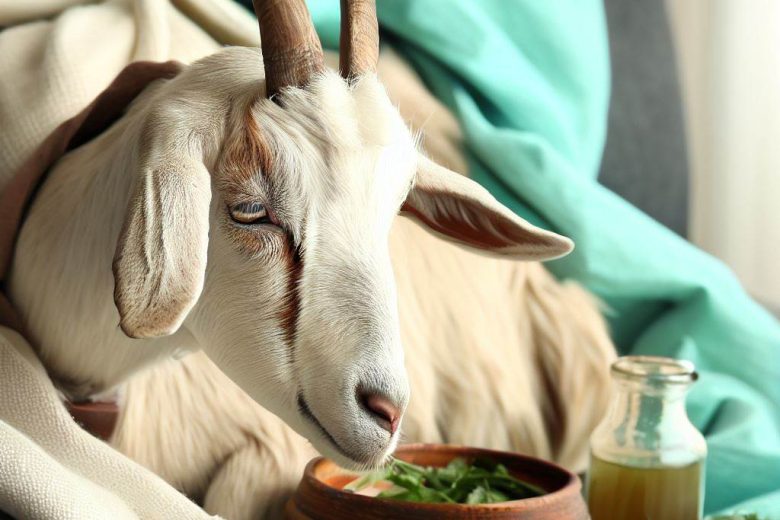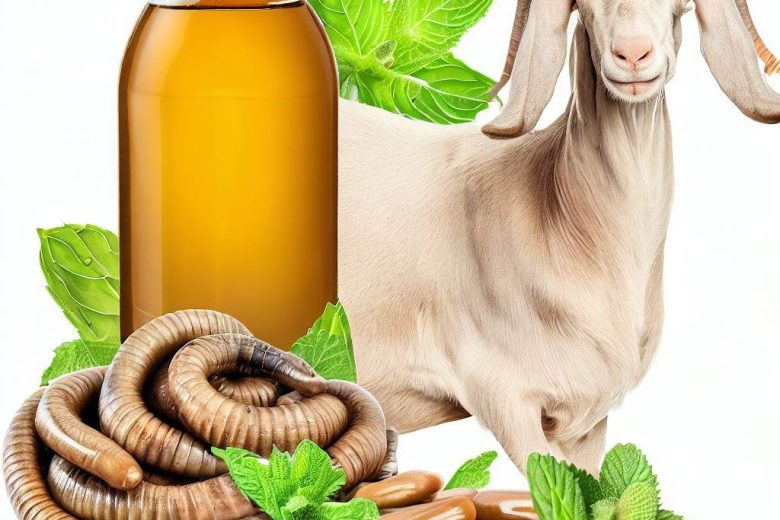Goats are hardy animals that generally thrive in various environments. However, just like any living being, they can sometimes fall ill due to various factors such as stress, poor nutrition, parasites, or exposure to harsh weather conditions.
While it’s always recommended to consult a veterinarian for proper diagnosis and treatment, there are several home remedies that can help alleviate minor health issues in goats. These remedies are not meant to replace professional veterinary care but can offer temporary relief in certain situations.
10 Home Remedies for Sick Goats

1. Electrolyte Solution:
Dehydration is a common concern when goats are sick. Preparing an electrolyte solution with water, salt, and sugar can help restore electrolyte balance and maintain hydration levels. Commercial electrolyte mixes are also available at feed stores and can be a quick solution.
Read Also: 10 Herbs for Diarrhea Treatment in Goats [Beginner’s Guide]
2. Garlic:
Garlic is known for its natural antibacterial and antiviral properties. Adding crushed garlic to your goat’s feed or water can help boost their immune system and potentially fend off mild infections.
3. Honey:
Honey has soothing properties and can be beneficial for goats with minor throat irritations or coughs. A teaspoon of honey can be administered orally to help alleviate discomfort.
Read Also: 10 Natural Pain Relief Remedies for Goats [Herbs & DIY Meds]
4. Epsom Salt Soak:
Epsom salt can be used to create a soothing soak for a goat’s hooves. This remedy can help address foot rot or other minor hoof issues. Mix Epsom salt with warm water and allow the goat to soak their hooves for a short period.
5. Apple Cider Vinegar:
Apple cider vinegar is believed to have various health benefits for goats. It can be added to their drinking water in small quantities to potentially aid digestion and maintain a balanced pH in their digestive tract.
Read Also: Coccidiosis in Goats [Causes, Symptoms, and Treatment]
6. Herbal Teas:
Herbal teas like chamomile, peppermint, or fennel can have calming and digestive benefits for goats. These teas can be brewed and cooled before being offered in their water or mixed with their feed.
7. Probiotics:
Probiotics are beneficial bacteria that support a healthy gut. You can find goat-specific probiotics at farm supply stores or administer a small amount of plain yogurt to introduce good bacteria into their digestive system.
Read Also: Albon for Goats [All You Should Know]
8. Olive Oil:
Olive oil can help with constipation in goats. A tablespoon of olive oil can be offered orally to help lubricate the digestive tract and ease the passage of stool.
9. Cranberry Juice:
Cranberry juice can be used to help prevent and treat urinary tract infections in goats. It contains compounds that inhibit the growth of certain harmful bacteria. Mix a small amount of unsweetened cranberry juice with water and offer it to the goat.
10. Aloe Vera Gel:
Aloe vera gel can be applied topically to minor cuts, wounds, or skin irritations. It has soothing and healing properties that may aid in the recovery process.
Home Remedies for Sick Goats with Diarrhea:
Diarrhea in goats can lead to dehydration and weakness. Offer electrolyte solutions to maintain hydration. Mix equal parts of water and unflavored Pedialyte, and give it to the goat frequently. Incorporate rice water or a mixture of rice flour and water into their diet to help firm up stools. Avoid high-sugar or high-fat feeds during this time.
Read Also: Miscarriage In Goats & Sheep [Signs, Causes, and How to Prevent]
How to Save a Goat from Dying:
If you suspect a goat is seriously ill, consult a veterinarian immediately. Keep the goat warm and in a quiet, stress-free environment. Provide electrolytes to prevent dehydration and encourage eating. Administer necessary medications as advised by the vet. Ensure proper ventilation and sanitation to prevent the spread of illness to other goats.
Goat Dying Symptoms:
Signs that a goat might be dying include extreme lethargy, labored breathing, inability to stand, refusal to eat or drink, and a noticeable drop in body temperature. These symptoms often warrant immediate veterinary attention.
Read Also: [Beginners Guide] Hydroponic Fodder Production For Goats PDF
Sick Goat Won’t Get Up:
A goat that won’t get up might be suffering from various issues, including pain, illness, or injury. Carefully examine the goat for any visible injuries, and consult a vet for a proper diagnosis. Provide a comfortable and warm space for the goat to rest, and consider offering pain relief if approved by the vet.
Read Also: [Beginner’s Guide] 10 Best Herbal Goat Dewormers
Goat Not Eating and Lying Down:
Loss of appetite and lethargy can indicate illness. Offer a variety of fresh, palatable foods to encourage eating. In the meantime, provide supportive care such as keeping the goat warm and hydrated. If the goat continues to refuse food, seek veterinary attention.
Sick Goat Symptoms:
Sick goats might exhibit symptoms such as lethargy, reduced appetite, fever, nasal discharge, coughing, diarrhea, and changes in behavior. These signs can vary based on the underlying illness. Consult a veterinarian to properly diagnose and treat the issue.
Read Also: 25 Common Diseases Of Goats And How To Treat Them
Mastitis in Goats Treatment:
Mastitis, an udder infection, requires prompt attention. Milk out affected udders frequently to prevent further infection. Apply warm compresses to ease discomfort. Antibiotics prescribed by a vet are crucial to treating mastitis. Keep the goat’s living area clean to prevent recurrence.
Read Also: [Beginner’s Guide] How to Identify Dying Goat In Your Farm
Herbal Remedies for Goats:
Some herbal remedies can offer support for goats’ health. Garlic can boost immune function, while chamomile and peppermint teas can aid digestion and calm goats. Herbal tinctures like echinacea can be added to their water to enhance immune response. However, always consult a veterinarian before using herbal remedies to ensure they’re safe and appropriate for your goats.
Conclusion
While home remedies can offer temporary relief and support for sick goats, it’s important to remember that serious illnesses or injuries require prompt attention from a qualified veterinarian. Regular health checks, proper nutrition, and a clean living environment are essential for maintaining the well-being of your goats.
These home remedies should be used as complementary measures and not as a replacement for professional veterinary care. Always consult with a veterinarian before trying any new treatment, especially if you are uncertain about the nature of your goat’s illness.





2 Replies to “10 Home Remedies for Sick Goats [Beginner’s Guide]”